Velocity of Efflux: Torricelli's Theorem
Important Questions on Velocity of Efflux: Torricelli's Theorem
A small body of density is dropped from rest at a height into a lake of density where Which of the following statements is/are correct if all dissipative effects are neglected (neglect viscosity)?
A tank is filled upto a height with a liquid and is placed on a platform of height from the ground. The distance x from the ground where a small hole is punched to get the maximum range is :
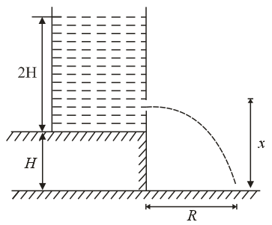
A cylindrical container of radius and height is completely filled with a liquid. Two horizontal shaped pipes of a small cross-section area are connected to the cylinder as shown in the figure. Now the two pipes are opened and fluid starts coming out of the pipes horizontally in opposite directions. Then the torque due to ejected liquid on the system is:
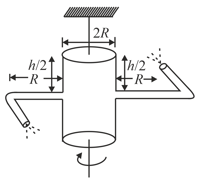
The area of two holes and are and respectively. The holes are at height and from the surface of the water. Find the correct option(s):
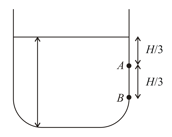
A container filled with liquid up to height is placed on a smooth horizontal surface. The container is having a small hole at the bottom. As the liquid comes out from the hole, the container moves in a backward direction with acceleration and finally, when all the liquid is drained out, it acquires a velocity Neglect mass of the container. In this case
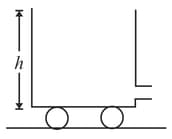
In a cylindrical water tank there are two small holes and on the wall at a depth of from the upper level of water and at a height of from the lower end of the tank, respectively, as shown in the figure. Water coming out from both the holes strike the ground at the same point. The ratio of and is
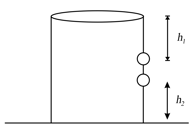
A tank is filled with water of density and oil of density . The height of water layer is and that of the oil layer is . The velocity of efflux from an opening in the bottom of the tank is
A large open tank has two holes in the wall. One is a square hole of side at a depth from the top and the other is circular hole of radius at a depth from the top. When the tank is completely filled with water, the quantities of water flowing out per second from both holes are the same. Then, is equal to

